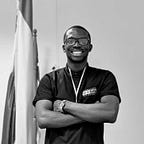Disability: A Part of Human Diversity
#Rule 1: Everybody is disabled, just in different ways
The inspiration behind this article is my friend, Monica Ghaliwa, the first female visually impaired journalist in Sierra Leone. Having met with her at the Young African Leaders Initiative Cohort 14, which was held in the city of Accra, I blatantly felt her desire to change Africa and the narrative about persons living with disability.
When we design for disability, we all benefit.-Elise Roy
A truth that many shy away from is that at some point in their lives will experience one type of disability or the other. Sometimes, this disability is reversible when immediate treatment is available, other times it’s not. Disability is a rare kind of diversity and the sooner we embrace this, the better it becomes to live with it. It has become no news that persons living with disability are treated unfairly in the society. Our society has lost her childhood innocence and has refused to share the burden of care to persons who do not meet the defined societal standards. A society that refuses to believe in the innate diversity in disability, and in failing to take action is dooming itself for an inevitable loss of physical and mental abilities.
As change-makers, we are saddled with the responsibility of creating a society that allows a mocktail of persons with and without disability to interact and coexist together. These interaction processes should fuel more innovative, disruptive and diversified thinking as this thinking process is not capped or limited — ideas generated are based on real life experiences rather than baseless assumptions. In essence, as most inventions such as text-messaging originally tailored for persons hard of hearing became so good that everyone fell in love with it, it is important to note that the more persons with disability are engaged in vital decision-making process in a country, in tandem, will lead to a more economic and social development. This is far from the case in Africa, especially in Nigeria.
Africa (àfi ìkà)
In Africa, disability is treated as a curse from the gods. Ancient history talked about how persons with disability were used as tourist attractions. bound in chains and sold as slaves. In severe cases, they are put in cages or condemned to death and, some of them are left to meander and in the end bite the dust. All these indirectly created a dent in the minds of people and also a barrier that prevented affected persons from interacting with the society.
These barriers include “prevailing attitudes and preconceptions, leading to underestimation; the policies, practices and procedures of local and national government; the structure of health, welfare and education systems; lack of access to buildings, transport and to the whole range of community resources available to the rest of the population; and the impact of poverty deprivation on the community as a whole and more specifically on persons with disabilities and their families” (Innocent Digest, 2007:5).
Because of this, such persons suffer too far a great deal — stigmatization, societal rejection — and also find it difficult to live in a world where they are considered non-existent. How do we then expect a collaboration between persons with and without disability? Even in these sufferings, their number keeps increasing.
In 2006, 3.2 million of Nigerians had at least one disability. In 2011, It was ratified that this number had increased to 20 million. Why then do we shy or run away from persons with disability? What use does this create when we are aware that the number keeps increasing with time? Why don’t we have the interest of them in mind whenever we are building social infrastructures?
The Nigerian National Assembly in 2013 estimated the there are over 20 million people living with disability in the country (www.nassnig.org/nass/). However, this number has increased with a wide margin because, according to the Center for Disability and Development Innovations (CeDDI, 2016), the approximate number of disabled people in the country is 25 million. The United Nations (UN) projected that in every ten people in Nigeria, one person is suffering from one type of disability or the other.
The four most common types of disabilities in Nigeria are in descending order: visual impairment, hearing impairment, physical impairment and intellectual impairment. This clearly shows us that these persons can be trained. Being disabled isn’t tantamount to madness or being dead. Although in the perspective of some disabled persons, they see themselves as a failure because of what the society has led them to believe. For instance, Amina who attended a rehabilitation center in Kaduna said: “A disabled person is someone who cannot do anything, who is useless. A disabled person is someone who is dead and gone” Such derogatory statement about herself because she wore the eyes of the society.
It is high time we changed the narrative as individuals and see the diversity in disability. Let’s be solicitous to proffer innovative solutions that can create a unification between persons with and without disability. This will undoubtedly imbue the society with the long-anticipated restoration within and without.
